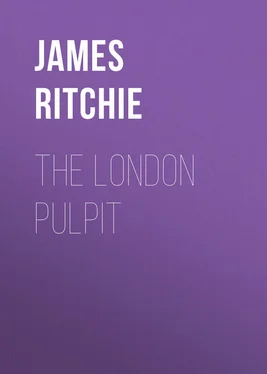James Ritchie - The London Pulpit
Здесь есть возможность читать онлайн «James Ritchie - The London Pulpit» — ознакомительный отрывок электронной книги совершенно бесплатно, а после прочтения отрывка купить полную версию. В некоторых случаях можно слушать аудио, скачать через торрент в формате fb2 и присутствует краткое содержание. Жанр: foreign_prose, на английском языке. Описание произведения, (предисловие) а так же отзывы посетителей доступны на портале библиотеки ЛибКат.
- Название:The London Pulpit
- Автор:
- Жанр:
- Год:неизвестен
- ISBN:нет данных
- Рейтинг книги:3 / 5. Голосов: 1
-
Избранное:Добавить в избранное
- Отзывы:
-
Ваша оценка:
- 60
- 1
- 2
- 3
- 4
- 5
The London Pulpit: краткое содержание, описание и аннотация
Предлагаем к чтению аннотацию, описание, краткое содержание или предисловие (зависит от того, что написал сам автор книги «The London Pulpit»). Если вы не нашли необходимую информацию о книге — напишите в комментариях, мы постараемся отыскать её.
The London Pulpit — читать онлайн ознакомительный отрывок
Ниже представлен текст книги, разбитый по страницам. Система сохранения места последней прочитанной страницы, позволяет с удобством читать онлайн бесплатно книгу «The London Pulpit», без необходимости каждый раз заново искать на чём Вы остановились. Поставьте закладку, и сможете в любой момент перейти на страницу, на которой закончили чтение.
Интервал:
Закладка:
But a man must not quarrel with the conditions he has imposed on himself. You have your choice. You wish to preach the truth. Well, you can do so, in the Church or out of it; but in the one case you are more or less tied. You may preach the truth; but it must be Church’s truth, if you take the Church’s pay. Of course, this is a disagreeable position to an independent man; at the same time, it is not without its corresponding advantages. You get into good society, you have a respectable living, you may marry an heiress, or become tutor to a Prime Minister or a Prince. Outside the Church men of intellect generally have taken their stand, for it is perilous to tamper with convictions in order to maintain a position.
It is easy to see how, in Maurice’s own case, what power has been thrown away in this tantalizing task. Had he started fresh, with no creed for him to conform to, with no position to maintain, he would have been a far more vigorous thinker than he has ever been. But he has ever had to come back to the Church – to the doctrines and teachings of men. A Church that shall embrace the religious life and thought of England, coëxistent with the nation, after all is but a dream. Were there such a Church, Maurice would hold no mean rank in it. But the State Church is not such, and cannot be such, unless its articles and creeds be glossed over with a Jesuitry not more ingenious than fatal to all moral growth. But each generation tries the hopeless task. The men of intellect and purpose in the Church have felt themselves in a false position, and have laboured to get out of it. They have trusted to one and then another. For a long time Mr. Maurice has been the coming man. The Church was once more to be a power – to have the nation’s heart – to enlist the nation’s intellect on its side. Writing in his usual bitterness, Carlyle says:
‘The builder of this universe was wise,
He plann’d all souls, all systems, planets, particles!
The plan he shaped his worlds and æons by,
Was – Heavens! – was thy small Nine-and-Thirty Articles.’
Mr. Maurice has accepted this language as sober truth, and has made that truth the pole-star of his ministerial life.
Most of our readers know Lincoln’s-inn-fields. It abounds with lawyers. In one part of it surgeons are plucked, and in another, clients. It has a small chapel not far from Chancery-lane, and if the residents of Lincoln’s-inn-fields attended it, there would be but little room for strangers. However, this is not the case, and thus I managed to get in. It is a curious old place. It was built by Inigo Jones; and the then popular and admired, but now forgotten, Dr. Donne, preached the consecration sermon. The walls have reëchoed to the oratory of Secker and Tillotson. The windows are of stained glass, and one of them, containing St. John the Baptist, was executed at the expense of William Noy, the famous Attorney-General of Charles I. In the crypt, underneath the chapel, are buried, Alexander Broome, the cavalier song-writer; Secretary Thurloe, who had chambers in the Inn; and that stern Puritan, William Prynne, who wrote about ‘The Unloveliness of Love Locks.’ During Term time this chapel is open for worship every afternoon at three; and the preacher is the Rev. Mr. Maurice.
Considering the position Mr. Maurice has attained, and the notoriety attaching to his name, your first feeling is one of wonder that he has not a larger congregation. After writing more books on theology than any other clergyman of the day – after teaching more youth – after mixing up himself more with the working classes than almost any other man I know of – one is surprised that Mr. Maurice’s audience is not larger; and I can only account for it by supposing that his task is impossible, and that he is fighting a hopeless fight; or on the supposition that, after all, Mr. Maurice’s place is not the pulpit, but the professor’s chair: yet that he has a numerous class of followers, the sale of his books is an unanswerable proof – a sale, however, much commoner amongst Dissenters, I have good reason to suppose, than amongst the clergy of the Established Church. Mr. Maurice has the true appearance of the professor – short dark hair, sallow face, precise manner: all indicate the man of study and thought. His voice is clear and agreeable, though not strong. His reading is very rapid, but, at the same time, emphatic. As to action, he has none. He aims more at what he says than how he says it; and, if you listen, you will find food for thought in every phrase. You can hardly imagine that the man before you has been charged with heresy, he seeming to differ in no other respect from other clergymen, save in his superior power of ratiocination and in the wider inductions on which he bases his doctrines.
What Mr. Maurice’s opinions are he has taken full care to place before the world. He is a churchman in the fullest sense of the term. ‘I have contended,’ he writes in his ‘Kingdom of Christ,’ ‘that a Bible without a Church is inconceivable; that the appointed ministers of the Church are the appointed instruments for guiding men into a knowledge of the Bible; that the notion of private judgment is a false notion; that inspiration belongs to the Church, and not merely to the writers of the Bible; that the miracles of the New Testament were the introduction of a new dispensation, and were not merely a set of strange acts belonging to a particular time; lastly, that the Gospel narratives must be received as part of the necessary furniture of the Church.’ One would have thought such churchmanship as this would have satisfied any one. However, the cry of heresy has been raised, principally, it seems, because he denies the doctrine of eternal damnation – an awful doctrine, we do not venture to affirm or condemn here. Because he has done this, he has been branded with infidelity; and The Record , and The Morning Advertiser – neither of them journals distinguished for talent, but rather the reverse – hounded on the public indignation against Mr. Maurice, forgetting that no man has so earnestly laboured to Christianize – not the dark tribes of Polynesia, for then these journals would have been redolent with his praise – but the savages with white faces and dark hearts that we meet in our streets every day.
It is melancholy to think that wretched theologians may aim their small shot at such a man, merely because his idea of God and Christianity may be less fearful, more loving and humane, than their own. Surely a man may love God and his neighbour as himself – may believe Christ suffered for the sins of the world – without being hooted by every ignorant or unreasoning fool, because, on other matters – matters merely speculative – matters too dark for man ever to fully inquire into or completely to understand – his opinions differ from their own. Proud as we are of our press, yet such exhibitions should make us mourn, that at times it can so far forget Christian charity and common sense, and descend so low. One thing is clear, that there is no tribunal in the Church that can satisfactorily settle the question of heresy; and another thing is clear, that whilst so many men differing so widely from each other are in the Church, the question with the majority of them cannot be one of principle but of pay. Churchmen should be the last to raise the cry of heresy, for it is a revelation to the world of what must ever be their weakness and their shame.
Mr. Maurice, after all, is thrown away where he is: all his life he has been in an uncongenial position. The son of a dissenting minister, the habits he acquired have clung to him from his earliest youth. Hazlitt tells us how a man so nurtured grows up in a love of independence and of truth; and such a one will find it hard to retain a connection long with any human organization and creed. Then, as the brother-in-law of Sterling, Maurice would naturally be led to modes of thought and action other than those the Church had been in the habit of sanctioning. Eminently religious, he never could have been what he was to have been, a lawyer; but as an independent writer on religion, as a co-worker with Isaac Taylor, of Ongar, for instance, what might he not have done? Another mistake of Maurice’s is, that his mission is to the poor. His style is the very last that would be popular with such. In the pulpit or out, Maurice preaches not to the public, but to the select few – to literary loungers – to men of ample time and elevated taste – to men of thought rather than of action – to men freed from the hard necessities of life, and who can leisurely sit and listen to his notes of ‘linked sweetness long drawn out.’ Hence is it that he is more a favourite with intellectual dissenters than with churchmen, and that I believe at Lincoln’s-inn-fields his congregation is made up more of the former than the latter. They love his efforts at self-emancipation; they admire his scholarship, his piety, his taste. They eminently appreciate him, as he, like the intellectual power of the poet,
Читать дальшеИнтервал:
Закладка:
Похожие книги на «The London Pulpit»
Представляем Вашему вниманию похожие книги на «The London Pulpit» списком для выбора. Мы отобрали схожую по названию и смыслу литературу в надежде предоставить читателям больше вариантов отыскать новые, интересные, ещё непрочитанные произведения.
Обсуждение, отзывы о книге «The London Pulpit» и просто собственные мнения читателей. Оставьте ваши комментарии, напишите, что Вы думаете о произведении, его смысле или главных героях. Укажите что конкретно понравилось, а что нет, и почему Вы так считаете.












